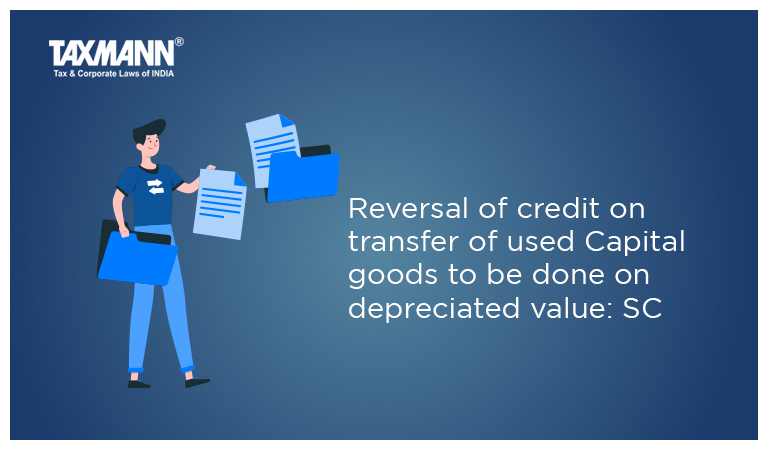Reversal of credit on transfer of used Capital goods to be done on depreciated value: SC
- Blog|News|GST & Customs|
- 2 Min Read
- By Taxmann
- |
- Last Updated on 6 September, 2022

Case Details: Betts India (P.) Ltd. v. Commissioner of Central Excise - [2022] 142 taxmann.com 90 (SC)
Judiciary and Counsel Details
-
- B.R. Gavai & Pamidighantam Sri Narasimha, JJ.
- Ms Charanya Lakshmikumaran, AOR Aaditya Bhattacharya, Ms Mounika Kasturi, Ms Apeksha Mehta & Sahil Parghi, Advs. for the Petitioner.
- N. Venkatraman, ASG, Vaishali Verma, Ms Nidhi Khanna, Sanjay Kr. Tyagi, B.K. Satija, Mrs B. Sunita Rao, Gunmaya Mann, Ms Sanskriti Pathak, V. Chandrashekhar Bharathi, Ms Amritha Chandramouli, S. Ram Narayanan, Advs. & Mukesh Kumar Maroria, AOR for the Respondent.
Facts of the Case
The appellant assessee had cleared used capital goods to its own unit by reversing credit on depreciated value. The department sought such reversal on full value on ground that at relevant time of clearance, there was no provision of such reversal on depreciated value. The appellant lost the appeal before the CESTAT and High Court. Now, it filed appeal before the Honorable Supreme Court.
Supreme Court Held
The Supreme Court observed that Rule 57-S(2) of erstwhile Central Excise Rules, 1944 provided for reversal of credit on depreciated value in case of transfer of used capital goods. However, while framing Cenvat Credit Rules, 2004, this proviso got omitted by a legislative slip but an amendment in 2007 was carried to insert said proviso again.
The amendment in year 2007 inserting proviso to rule 3(5) of Cenvat Credit Rules, 2004 being clarificatory would have retrospective affect and it was also held by the High Court. In instant case, undisputedly appellant had used capital goods from year 1999 to 2004 before clearing to another self-owned unit in 2005. Since, the aforesaid proviso was applicable right from 2004 itself, therefore its benefit could not have been denied to appellant. Hence, the appeal was allowed.
List of Cases Reviewed
-
- E.A. No. 4 of 2009, decided on 24-9-2019 by Bombay High Court (para 3) reversed.
List of Cases Referred to
-
- W.P.I.L. Ltd.v. Commissioner of Central Excise 2005 taxmann.com 751/181 ELT 359/3 SCC 73 (para 5).
Disclaimer: The content/information published on the website is only for general information of the user and shall not be construed as legal advice. While the Taxmann has exercised reasonable efforts to ensure the veracity of information/content published, Taxmann shall be under no liability in any manner whatsoever for incorrect information, if any.

Taxmann Publications has a dedicated in-house Research & Editorial Team. This team consists of a team of Chartered Accountants, Company Secretaries, and Lawyers. This team works under the guidance and supervision of editor-in-chief Mr Rakesh Bhargava.
The Research and Editorial Team is responsible for developing reliable and accurate content for the readers. The team follows the six-sigma approach to achieve the benchmark of zero error in its publications and research platforms. The team ensures that the following publication guidelines are thoroughly followed while developing the content:
- The statutory material is obtained only from the authorized and reliable sources
- All the latest developments in the judicial and legislative fields are covered
- Prepare the analytical write-ups on current, controversial, and important issues to help the readers to understand the concept and its implications
- Every content published by Taxmann is complete, accurate and lucid
- All evidence-based statements are supported with proper reference to Section, Circular No., Notification No. or citations
- The golden rules of grammar, style and consistency are thoroughly followed
- Font and size that’s easy to read and remain consistent across all imprint and digital publications are applied



 CA | CS | CMA
CA | CS | CMA
